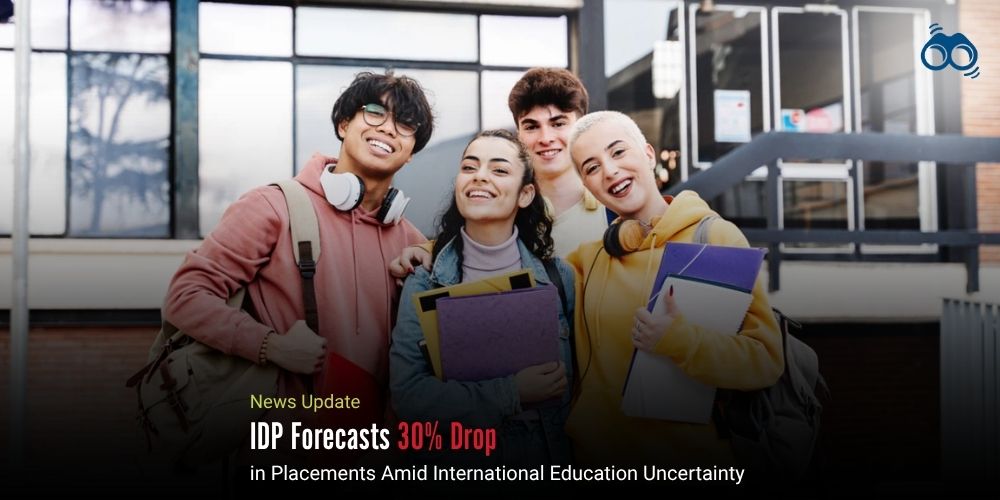US, UK, Canada, and Australia Policy Shifts Disrupt International Student Enrolment
Global Education Sector in Turmoil: IDP Reports Sharp Decline in Student Placements
The global education sector is facing significant challenges as political and policy shifts disrupt international student enrolment. IDP Education, a leading provider of student placement services, has reported that uncertainty across the four major study destinations, the US, UK, Canada, and Australia, is affecting its enrollment pipeline for the 2025 financial year. According to newly released documents, various policy changes are contributing to this instability. The US continues to experience unpredictability under the Trump administration, while the UK is expected to tighten immigration rules. Meanwhile, Canada and Australia appear likely to maintain restrictive education policies following their recent elections.
In a market update issued by the Australia-based organisation, IDP forecasted a significant decline in student placement volumes, anticipating a drop of approximately 28–30% for the financial year. This projection was based on aggregated visa data from its four key markets, which showed a 28% year-on-year decrease in international student numbers. In response to the ongoing policy uncertainty, IDP stated that it was conducting a comprehensive review of its long-term strategies, including costs, productivity, investment plans, and commercial priorities. The company promised further updates during its financial results announcement scheduled for August.
Additionally, IDP predicted a year-on-year decline of 18–20% in language testing volumes. However, it suggested that this would be partially offset by continued growth in average testing fees, which could cushion the impact on overall revenue. The company observed that the uncertain policy environment had affected both the size and conversion rates of its student enrolment pipeline, particularly during the critical May and June intake periods. These intakes are key for the autumn semester in the UK, Canada, and the US, as well as the second semester in Australia.
Financially, IDP estimated that its EBIT (Earnings Before Interest and Taxes) for the 2025 financial year would fall within the range of $115 million to $125 million. Despite these short-term challenges, the company expressed confidence in the sector’s long-term fundamentals. It stated that it was well-positioned to grow its market share and respond effectively once market conditions began to stabilise. The company also announced plans to finalise a review of its long-term commercial priorities by August and highlighted its ongoing investment in AI technologies as a key element of future growth.
In the meantime, IDP acknowledged that both policy and economic uncertainty, as well as negative rhetoric, continued to pose challenges. Nevertheless, it maintained that, with a clear strategic direction, an experienced global team, and a strong financial foundation, it was prepared to lead the international education sector through this turbulent period and emerge stronger in the long term. Ultimately, while short-term instability remains a concern, IDP remains optimistic about the future of international education and its ability to adapt to evolving market conditions.
Editor’s Note:
The growing instability in international education policies across leading study destinations is a cause for serious concern. Students aspiring to study abroad are increasingly confronted with uncertainty, prolonged delays, and rising barriers, making global education less accessible than ever before. From the unpredictable environment in the United States under Donald Trump to the UK’s tightening of immigration rules and the continued restrictive approaches in Canada and Australia, the trend points to a troubling shift that could limit access for capable and ambitious students worldwide. While IDP Education’s decision to reassess its strategies is a timely and necessary response, the marked decline in student placements and language testing volumes signals a broader crisis within the higher education sector. Should governments persist with restrictive policies, they risk losing not only tuition revenues but also the wider economic and intellectual benefits that international students bring, from research contributions to innovation and cultural exchange. International education transcends mere commerce, driving academic excellence, intercultural understanding, and global cooperation. Overlooking these aspects jeopardises the long-term strength of study destinations in a competitive global landscape, especially given the deterrent effect of negative rhetoric on applicants.
Skoobuzz sincerely hopes that governments and educational leaders will adopt a more balanced and forward-thinking approach, one that ensures international education remains inclusive, sustainable, and globally impactful.














0 Comments (Please Login To Continue)